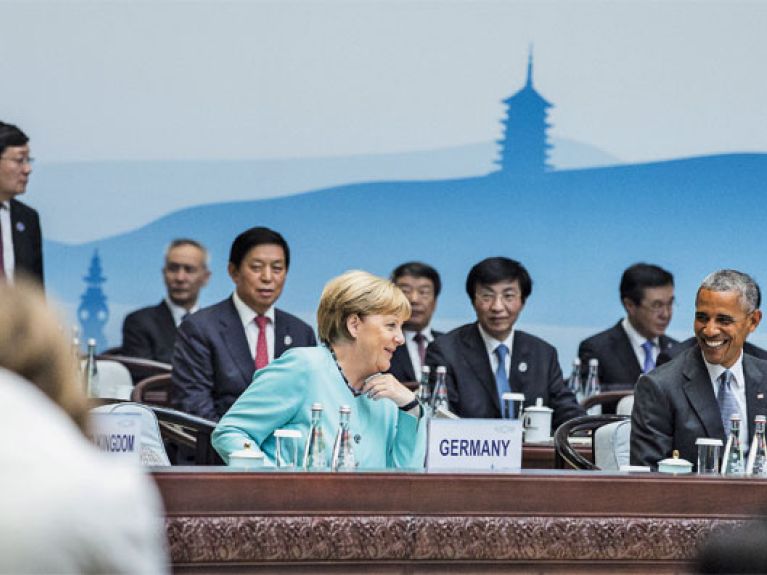Germany and the G20
Germany will assume the G20 presidency from China in 2017. A range of topics already emerged at the 2016 summit in Hangzhou.

Federal Chancellor Angela Merkel said “economic growth that benefits all” was the most important goal of the G20, which met in the city of Hangzhou in eastern China at the beginning of September 2016. Growth is traditionally at the centre of this summit of the 19 leading industrialised nations and emerging economies plus the European Union. This main theme was concretised this year. The Chinese presidency called for action plans and structural reforms. The participants were also agreed that digitalisation can be an important driver of development and growth. Furthermore, the heads of state and government reaffirmed that they will be forging ahead with the programme agreed one year ago to combat base erosion and profit shifting (BEPS). The OECD was requested to prepare a list of countries whose tax systems do not satisfy international standards with regard to transparency.
The Federal Chancellor also declared that not all impacts of globalisation are positive. Social responsibility and the fight against inequality are important issues, said Angela Merkel. “The discussion shows that sustainable growth combined with social security is important – that was also made clear here by many speakers and participants – a form of growth from which all population groups can profit. No matter whether newly industrialised countries, industrialised countries or developing countries, all of them pointed this out,” she said at the press conference. Because sustainable growth is closely linked with climate protection, Angela Merkel explicitly welcomed the ratification of the Paris climate agreement that China and the USA announced during the summit. “I can remember G20 summits at which the word ‘climate’ could not be mentioned. Today, the USA and China are two of the nations that are pushing strongly for the implementation of the Paris agreement.” The Paris agreement on which 195 countries agreed in the French capital in December 2015 includes a global action plan that aims to limit global warming to significantly less than 2°C.
Germany assumes the G20 presidency in 2017. Next year the summit meeting will be held in Hamburg on 7 and 8 July. Many of the subjects that were begun or raised during the Chinese presidency are to be reviewed and taken forward there. In China Merkel announced that next year in Germany there will be a meeting of digital ministers for the first time and that a G20 task force for innovation will be set up. An additional key area will also be Development Goals until 2030. “During our presidency we will focus very strongly on the subject of health – on the one hand, with regard to antibiotic resistance and, on the other, on the question of how the world community can better respond to international pandemics in the light of what we experienced with Ebola,” explained Merkel.
In connection with the Development Goals, Federal Finance Minister Wolfgang Schäuble announced a Compact for Africa that will be established under the German presidency to strengthen investment activity in Africa. Federal Chancellor Angela Merkel attaches great importance to the Compact for Africa, also because of its relevance to migration. She gave the following example: “There is ten times as much direct investment in the European Union as in the whole of Africa, although the population of Africa is twice as large. What is urgently needed is more direct investment in the countries of Africa; after all, under no circumstances can this be offset by government development aid alone.” ■

